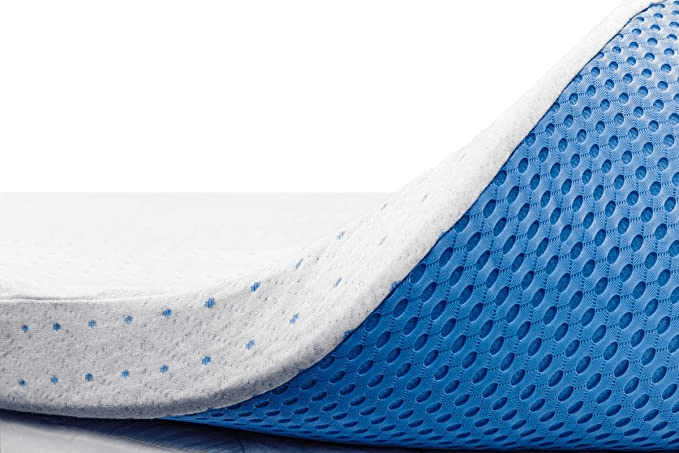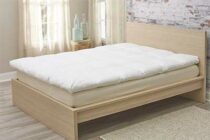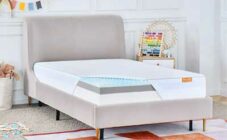Investing in a mattress pad is a great idea if you want to protect your mattress from dirt and spills. However, the waterproof barrier of a mattress pad can make some people feel too warm and sweaty. In this article, we will raise some concerns in regard to how mattress pads can make you sweat and how we can find beddings as alternatives. Memory foam mattress pads retain heat more than any other mattress materials due to their high density. Once the heat is absorbed by the mattress pad, it’s not easy for it to move out so there will be no air flow between the mattress and your body. To understand what type of mattress promotes the best thermal comfort during sleep, take a look at this study from Li et. al, 2020, Science and Technology for the Built Environment.
To fix a mattress pad that makes you sweat and sleep hot, select a bed frame that maximizes mattress airflow, choose suitable sheets that also promote proper airflow, and change your sleeping patterns.
3 great options to replace your mattress pad if it gets too hot
When none of the tips above work, choose a new mattress that contains cooling gels or additives such as charcoal, copper, or graphite to better absorb body heat. Some mattresses are even made with cooling fibers. A latex mattress or an innerspring mattress are naturally cooler than a memory foam mattress. We’ve discussed copper mattress pad benefits in detail in our article.
Bear in mind that the structure and material of a mattress pad is not the only factor that makes you sleep hot, but some mattress pads overheat because they are combined with warm bedding, a warm mattress underneath, or an unsuitable bed foundation.
Related articles:
- Wondering how to choose between a memory foam vs. a latex mattress topper to maximize mattress ventilation?
Step 1. Select a Bed Frame That Maximizes Mattress Airflow
Sleeping on an unsuitable foundation can make your sleep miserable. A bed frame with a solid base (such as a platform bed) or placing your mattress directly on the floor will keep heat trapped inside the mattress with no way to escape through the bottom. Therefore, the best beds for proper air ventilation are the ones with spaced slats. The slats will promote proper air circulation and will help you get a better and cooler sleep. Use slats that are spaced at least 1.5 inches apart (here are some from Amazon) so you can not only support your mattress properly but also promote ventilation.
Step 2. Choose Sheets Made of Naturally Cooling Fibers
Covering your mattress and mattress pad with breathable mattress covers made of natural fibers like cotton, bamboo, or linen will help you stay cool during your sleep. These materials tend to be thermoregulating. These mattress covers made of Bamboo are ~$35 on Amazon.
Avoid sheets that insulate heat like polyester or silk. The best sheets for proper airflow are the ones with lower thread counts.
Also note that waterproof mattress protectors made of vinyl tend to trap heat under your covers. If you’re sweating, it could help you to change to a non-vinyl waterproof mattress cover and to change your bed sheets.
You might enjoy reading this article about the difference between mattress pads vs. mattress protectors / covers.
Step 3. Change Your Sleeping Patterns
If you continue to be hot while sleeping in your bed, consider lowering the temperature of your bedroom by adjusting the thermostat, turning on a fan, or opening a window. You can also wear light and loose sleepwear made of cotton or bamboo to wick moisture away. Avoid wearing silk or polyester pajamas.
If you’re having a hard time sleeping, you should also look into the benefits of magnetic mattress pads. We’ve also discussed how to use magnetic mattress pads to increase comfort and reduce pain.
Why does your mattress pad make you sweat?
Sweating is a natural physiological process that regulates our body temperature. However, over sweating is an unfavorable process especially when it interrupts your continuous sleep.
One reason your mattress pad makes you sweat is because the protective layer inhibits air circulation in your mattress. For example, a waterproof vinyl mattress pad will trap hot air and prevent air circulation within your mattress.
A waterproof mattress pad has a vinyl layer, which protects the mattress against accidental liquid spills that can leach down into your existing mattress. Many sleepers have complained that this protective layer can cause you to overheat and leave you waking up feeling sweaty and uncomfortable.The liquid-proof insulator incorporated into the mattress pad interrupts the air circulation making it more difficult to regulate body temperature. Consequently, you may sweat even more than you probably would without a mattress pad. We’ve discussed how to properly protect a mattress pad in our article.
Examples of Mattress Pads that don’t make you Sweat
As mentioned in the first section of this article, there are several options that help reduce night sweats such as cooling mattress pads made of natural fiber pads, copper-infused pads, and open-cell memory foam pads.
Natural fibers like wool, cotton, feathers, and bamboo, are breathable materials that allow better air circulation, and can draw moisture away.
Latex is a natural material with better heat exchange and airflow compared to memory foam.
See below for 3 examples of mattress pads that won’t make you sweat.
| Product Name and Link to Amazon | Product Description (Why Won’t You Sweat) | Price |
| Ixelles Down FIlled Mattress Pad | This product is filled with a proprietary fluffy filling, which promotes better airflow, according to the manufacturer. | ~ $25 |
| Safe and Sound Waterproof Cotton-Alternative Mattress Pad | The top of the mattress pad has a wave like pattern, allowing air to circulate better through the protector to help evaporate moisture. | ~ $30 |
| ExceptionalSheets Down Alternative Mattress Pad | This bamboo cover is filled with breathable down alternatives, which ensures a cool and comfortable sleeping experience. | ~ $85 |
Make sure to also take a look at our article that explains how long does a wool underlay last for another alternative.
Testing What Bedding is Making You Sweat
For sweat-free sleep, you need to keep your room cool and choose the right bedding for your bed. With the right mattress and bedding, you will definitely be able to enjoy a cool night’s sleep. Sometimes it is difficult to know what bedding is making you sweat. It may be helpful to remove one piece after another to find out how it feels to sleep without it.
To test what bedding is making you sweat, first you should sleep without a mattress pad, then you can try to sleep without a comforter, or you can finally try to sleep on a carpet without a mattress.
Sleep Without A Mattress Pad
If you wake up fresh and cool after sleeping without a mattress pad, then it is obviously your mattress pad that is making you sweat and sleep uncomfortably during the night. Try changing the material of your mattress pad to ensure you will have a better sleep at night.
Sleep Without A Comforter
Your comforter may be the reason you sweat during your sleep. A comforter is available in different materials. If you wake up feeling better after sleeping without a comforter, then you should definitely go for a lighter and cooler fabric.
Sleep On The Floor Without A Mattress
Sleeping on the floor without a mattress is not a great idea. Since you’ve already ruled out your mattress pad and your comforter, you can use those for adding some padding. However, if you want to know whether or not your mattress is the cause of your night sweats, try to sleep without a mattress and check the difference in the morning. If you feel fresher and cooler without your mattress, then choose a new one.
Related articles:
- How do you replace a mattress protector that makes you hot?
- How traditional japanese futon mattresses and tatami mats can help you sleep cooler
Can Night Sweats Ruin A Mattress?
Sweat and body oils do not just stay on the upper surface of the mattress but can penetrate all the way down. This may cause bacterial growth and musty smell if not taken care of.
Night sweats ruin your mattress because moisture and body oils create a perfect environment for dust mites and microorganisms, which can proliferate and breed inside your mattress to bite you and to cause allergies.
The European Journal of Allergy And Clinical Immunology has stated in one of its articles that bed infestation occurs inside mattresses even during the winter season due to elevated humidity when the bed is occupied.
Wondering how long mattress pads like magnetic mattress pads last?
Tips to Make a Mattress Pad and Bedding Comfortable to survive Hot Flashes
Excessive sweating is uncomfortable and annoying during night sleep. Perimenopause is a hormonal anomaly that causes signs among which are heat flashes and sleep disturbance.
To make a mattress pad and bedding comfortable to survive hot flashes use a waterproof or a well ventilated mattress pad or protector that isn’t made of vinyls, or use a firmer mattress or mattress topper with cooling sheets and pillowcases.
Although a good mattress pad and bedding will not block the perimenopause symptoms from emerging, they can promote proper air circulation and therefore mitigate these symptoms. Furthermore, placing a protector or waterproof mattress pad on top of your existing mattress will prevent your mattress from getting tarnished by frequent night sweating. We’ve also discussed how often to replace a mattress protector to combat hot sweats and maintain mattress life.
Use a cooling mattress pad, or ventilated mattress topper made of natural materials/fibers, copper-infused, gel-infused, zoned, or perforated mattress pads on top of a memory foam mattress. A memory foam mattress would give a good cushioning and welcoming feeling. However, given the fact that it cradles and molds to the shape of your body, it reduces your body exposure to air, which consequently slows down heat dissipation from your body. Another good idea is to use breathable bed sheets and pillowcases, and to sleep over a firmer mattress or mattress topper. This will help you sleep cooler and fresher at night.




